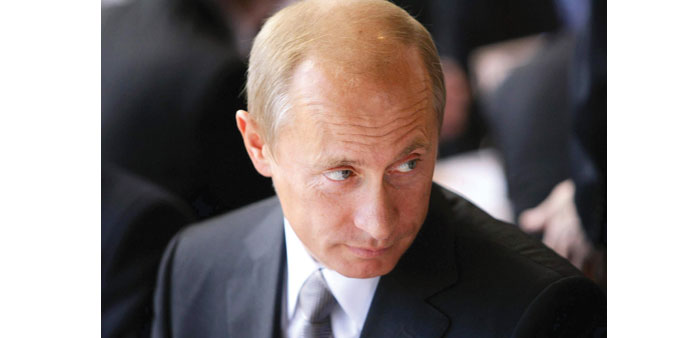By Anna Malpas, AFP
President Vladimir Putin may face international condemnation for his fast-track seizure of Crimea, but asset freezes and travel bans imposed by the West will not force him to alter course as he rides high in the polls.
Putin has seen his approval rating rise sharply since it became clear that Russia was taking control of Crimea, according to both state and independent polling agencies.
State VTsIOM reported his latest rating as the highest for three years at 71.6%, while even a survey by the opposition Fund to Fight Corruption found that 18.4% of Russians had a higher opinion of Putin since he threatened military intervention.
“Now his supporters are applauding: ‘Finally, we have a strong hand, we see a mighty leader’,” said Olga Kryshtanovskaya, a political analyst specialising in elites. “In domestic politics, all is well. Putin’s popularity is growing, his loyal electorate is rallying together and the core of his support is broadening.”
“So far Putin is riding high and he will be riding high in the near future,” said Alexei Malashenko of Carnegie Moscow centre.
The EU has unveiled travel bans and freezing of assets against Russian officials, while the US said it was imposing sanctions on officials and lawmakers.
But such measures are unlikely to frighten Putin. In the short term they will not affect him personally and will only boost his image of a leader who stands up to the West on matters such as Syria, gay rights or adoption.
Supported by a state propaganda machine that has gone into overdrive, this allows Putin to go out on a limb without his supporters flinching for now.
On Sunday evening, newsreader Dmitry Kiselyov jibed that Putin had given US President Barack Obama a fresh crop of grey hair.
The wealthy elite likely to be affected by international sanctions may already be pulling assets from the US but this is not something to worry ordinary Russians.
“Local sanctions towards individual members of the elite will not be noticed by society,” said Alexei Makarkin of the Centre for Political Technology in Moscow.
Putin’s rating seems to be little affected by economic woes, with independent Levada polling agency finding that the ruble’s plunge in 2009 only saw his rating fall by a couple of percentage points.
While economically, Putin has failed in a long-held goal of Ukraine joining a Customs Union with Russia, Belarus and Kazakhstan, in the public eye he is a victor.
Nevertheless, if economic sanctions bite, enthusiasm will falter, Makarkin said. “People aren’t ready to make serious sacrifices, they are not prepared for the possibility of a mobilised economy.”
As state television set the mood with hysterical rhetoric about “Fascists” in Ukraine, Putin gave just one relaxed briefing.
He even brushed off the prospect of Russia dropping out of the G8.
While around 50,000 turned out for an anti-war march in Moscow on Saturday, including a well-known rock star and Pussy Riot members, it barely merited a minute on state television news.
The question now is whether Putin will seek control over other eastern and southern Ukrainian regions such as industrial Donetsk, leading to much more far-reaching consequences, or will content himself with the seizure of Crimea.
“That would be a very risky game, too risky,” said Makarkin, since this would involve the far more drastic step of moving into a region where no Russian forces are based. “Russia will try to be cautious, and we are not doomed to an extremely radical scenario.”
But Malashenko warned that the emotional impetus might spur Putin on. “Recently Putin has been living on emotions. So it’s 80% that he won’t go further – based on logic – but you have to consider his emotions.”

